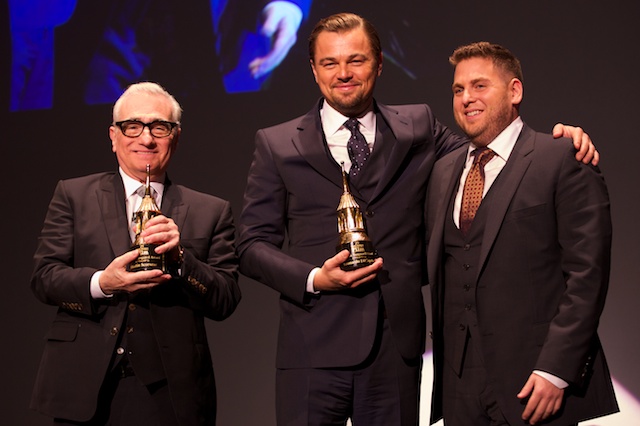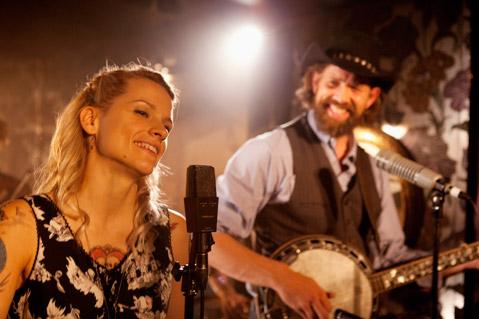Belgian Twang, Catholic Capers, and the Sundance Man in the ‘Hood
Leo & Marty, Redford Coming, and Eastern Bloc Stars

FROM WALL STREET TO SUBTITLE STREET: Festival-goers got another double-shot of a close Hollywood encounter in the Arlington on Thursday, the night the wolves of the Oscar season, Wolf of Wall Street’s Leo DiCaprio and Martin Scorsese came to town, returning to the scene of the tribute business where both have appeared separately in years past. The celebrity buzz factor was again flitting around town, anticipating the arrival of Robert Redford, in the tribute spotlight on Friday night. He is officially appearing as an actor whose All Is Lost has found him winning more rave reviews than he’s used to, but, unofficially, also graces the SBIFF-clutched city as a kind of film festival guru, whose venerable Sundance Film Festival serves as a paradigm which our own festival has emulated.
Down the street several blocks from the starry klieg-lit Arlington zone, the steady flow of fine foreign films continues through the weekend, including a re-energized “Eastern Bloc” selection of films which, as a whole, seems to be a galvanizing and illuminating force in the overall program scheme this year.
For one, Romanian cinema rules. Clearly one of the highlights of the festival this year, Child’s Pose is a starkly gripping and artful film from director Călin Peter Nelzer and featuring possibly the festival’s greatest performance, by Luminita Gheorghiu, which rightly won the Berlin Festival’s grand Golden Bear. It’s one of those deep, dark ventures into the human psyche, moral challenge, and a raw, effectively verite-ish cinematic approach which supercharges the story.
For lighter Romanian fare, proceed to the lyrical and lovely film, The Japanese Dog, a sweet study of village life which starts out at a leisurely, slice-of-life-like rustic pace with contemplative static shots. The tale of an older villager and his grown son’s family, in town after the mother’s death, grows and glows along the path to a heartwarming ending. One of its actors, Serban Pavlu, reappears in another, but very different family tale of the Romanian film Roxanne (very fine, though not as strong as The Japanese Dog.) A premise about possibly rerouted paternity from 20 years earlier, the film also touches on the built-in historical and emotional skeleton in the closet that is/was life in the Eastern Bloc, before and after the Curtain.
From Croatia, the irreverent, fable-like farce The Priest’s Children, is a sparkly Balkan delight, once you sink into its pace and perky texture. A bright and ribald Catholic caper, the film involves priests passing on the weight of their sins in the divulgence-free setting of confessional, a sneaky scheme to sabotage condoms and up the population of Catholics, and a Fellini-esque twist or two.
Moving to Poland during the Bloc-time, and the Apollo 11 moon-landing as an ambient reference point, One Way-Ticket to the Moon is a thoroughly charming coming-of-age road movie. An innocent young man is headed into the Navy, straight out of high school, and his brother schemes a three-day journey to initiate his younger sib by encouraging some sexual experience under the belt. All in all, director Jacek Bromski’s film is a colorfully-fashioned, tasty plate of Iron Curtain kitsch, with the scent of sex, vintage Polish pop songs, and a witty moon-meets-consummation scene on the side.

THUMBS-UPPING: Odd as it may seem, for the bluegrass and Americana-loving contingent of the SBIFF crowd, your best bet will be a little trip to Belgian cinema, and the bittersweet quirky delight The Broken Circle Breakdown. Starting with the thematic kernel of “Will the Circle Be Unbroken,” in the beginning and deep into the plot-juggling thicket of the plot, and including “Wayfaring Stranger” and other American/Appalachian favorites the film is chock full of all-American bluegrass-y goodness, authentically delivered, clean and with crisply articulated English and musical lingo.
This is Belgium’s Oscar bid film, which has become a wildly popular film at home and abroad. Late on Thursday afternoon, director Felix van Groeningen — part of a longer list than usual of filmmakers and artists in town during the festival — explained to the Lobero crowd that he adapted Johan Heldenbergh’s original song-filled stage play. He found an engaging way of pulling us into the story and its filmic potential, told in non-linear, flashback/flash-forward style, and with songs lining and informing the story path. Via the structure, we get hints and echoes of love’s rugged blissful beginning and later strife, tragic family matters, and plenty of musical grit and wisdom, as well as a rather bizarre atheistic rant late in the film.
Mostly, though, the film’s piece come together in a fresh and original way, energized by sex, tattoos, and banjo licks, with the dark stuff of life which inspires sad songs, and semi-sad films.



